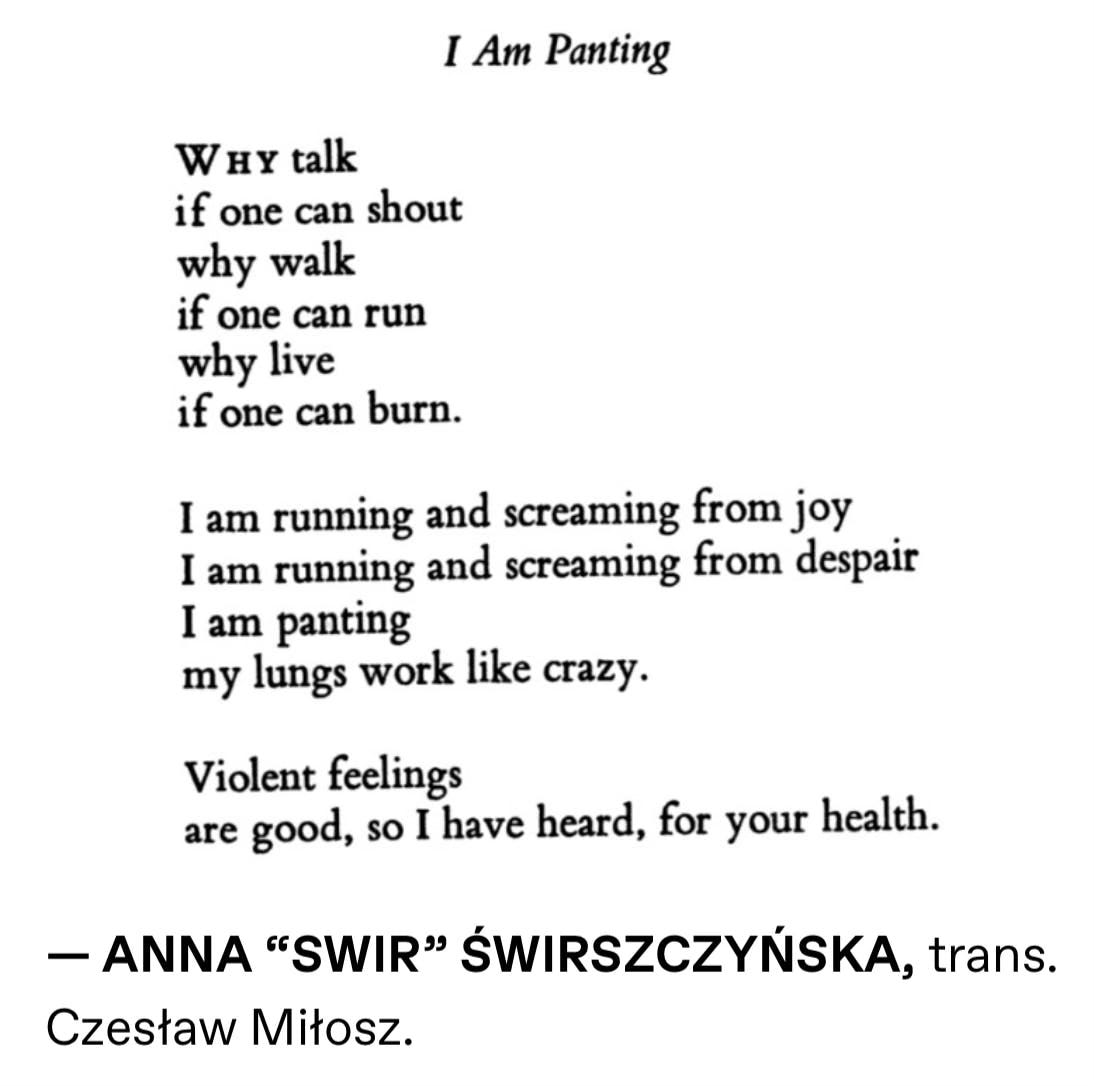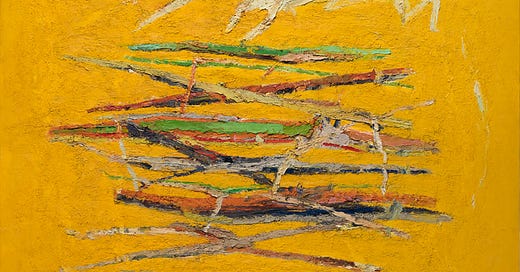“Purity does not lie in separation from but in deeper penetration into the universe” — Teilhard de Chardin.
I just read The Writing Life by Anne Dillard (thanks to Jacky for the rec), which ends with this quote. The book is a wonderful collection of segments, journal-like entries, and small meditations on the life of one who writes: the sleepless nights and uninspired days along with those moments of sudden, vicious grace.
I’m wrapping up a two-week vacation with my family, which felt much-needed after a hectic August of moving, work, and life prospecting. I was experiencing a dampening of curiosity, following a whirlwind summer of exciting projects, from a participatory art exhibit to a research prototype for a tinier, cozier, more personal internet (more to share soon now), and general life upheaval (living in a new city, figuring out what I want in a relationship and where I want to spend my time among my many interests).
I felt a nagging pressure to be productive. There were so many things I wanted to do that now felt like chores. I wanted to do them, but it felt more like I had to do them whenever I had a chance. I was scrambling between different tasks, a million decisions like invisible paper cuts weighing me down. It felt like I had no time to do the things I wanted to do, or in the little time I had, the minutes slid away as I dragged my uncooperative mind along. It felt like trying to mix oil and vinegar with a plastic fork. Whisking on and on, more motion than substance.
I’m trying to admire the inscriptions on trees, tiny mountain ranges in bark, but he won’t leave me alone. On my shoulder a little man in a business suit droning into my ear. Write that post. Finish that brief. Make that prototype. I’ve lost the path in my journey, so I plunged myself into the wilderness and stopped trying to get back on track.
When I come up with an idea, I often feel the urge to save them for a later time. When the timing is better. When I have more energy. When it’s more likely for the idea to be successful.
I’m a saver by nature. It stems from my relationship with money, where I’m hyper-conscious about value. I’ll almost always opt for public transport or taking a bike rather than using a ridesharing app, sell friends on sharing appetizers, choose bulk products for the bargain. This philosophy extends my hoarding tendencies. My ideas are my mental trinkets and old pieces of clothing, imbued with history and meaning, collecting dust and cobwebs in the corner of my mind. I feel an urge to save them for later, where they can come fully to life. While I love my passion for not leaving any waste and extracting creative uses from leftovers (both food and other random material objects), it becomes toxic when you never use anything or always have a decaying saved backlog.
Dillard implores against this frugality and urges us to spend and give more liberally:
One of the few things I know about writing is this: spend it all, shoot it, play it, lose it, all, right away, every time. Do not hoard what seems good for a later place in the book, or for another book; give it, give it all, give it now. The impulse to save something good for a better place later is the signal to spend it now. Something more will arise for later, something better. These things fill from behind, from beneath, like well water. Similarly, the impulse to keep to yourself what you have learned is not only shameful, it is destructive. Anything you do not give freely and abundantly becomes lost to you. You open your safe and find ashes.
I think this applies beyond writing life to any creative endeavor as well as our interactions with others.
Along with working on asserting my own needs better, without shame, I’ve been working on giving fiercely and spending freely.
I remember being stingy with my time growing up. My schedule was optimized for maximal efficiency, the most hours spent doing the things I wanted to do. Doing the things I needed to do (that didn’t overlap with the former) in the least amount of time possible. It meant leaving the house for lunch with my family on the weekend felt like a chore sometimes. I was also picky about helping others. I mostly did it when I felt like there was something in it for me, or if the actual work involved exercised the right parts of the brain. Manual labor felt like a terrible waste of time. I wanted to stick to the schedule that accomplished exactly what I wanted and needed to do.
My stinginess towards giving reflected my stinginess towards saving. I wanted to save things for the last moment. I don’t think I really wanted to spend them at all, in reality. What I was seeking was the comfort of knowing I had this contingency stash. I wanted to savor the idea of having the thing rather than the thing itself. Whenever I get ramen, I used to always save the ramen egg for last because it’s my favorite part. At the end I would often be too full to really enjoy it. In my saving I was corrupting what I loved, ruining my enjoyment of them. Robert Irwin is said to practice a philosophy of “lavish needs, modestly met,” which seems appropriate for embracing your very specific taste for food, aesthetics, behavior, and more. Enjoy them whenever possible, meet them as well as you can while understanding the constraints of your active situation.
The times I’ve felt the best giving a gift have been the ones given completely freely. No weird strings of obligation. No questioning of value. They feel like they emerged naturally. I saw or made something because I thought of you. That’s all. It’s the same for my best acts of spending. The pants I knew I would love, but was always outside my price range. A passion project that’s been stewing for two years but never felt appropriate timing-wise. The experience of a lifetime that collided with many other commitments. Something in your body gives you the space for these things. We should get better at listening when it does.
I think we try to hoard and save things for later because we don’t think we’re worthy of greatness now and we’re hedging for bad situation in the future. The goal is to maintain a minimum level of satisfaction, so we think, we feel fine now, why don’t we save that for a rainy day. We end up never using our saved potions, or when we do want to use they no longer give the same satisfaction we thought they would. We do it mostly for the act of saving, an insurance policy against feeling bad. This is a valid way to live, but it doesn’t make sense if your goal is to experience it all, the full spectrum of life in every moment.
Instead of avoiding feeling bad, what if we always sought fuller experience?
I want to feel the same towards the work I do. I never want to feel like I’m inhibited from expression because of the desire to save something for later. I want to lean fully into the surfacing energy and ride it as far as I can. Becoming a vessel for the idea and expression.
Every time we encounter the world, we give a piece of ourselves away. More precisely, we leave a piece of ourselves in the world, a mark of our presence. Many animals mark their territory by peeing along the boundary. Humans mark their territory by interacting with the world: a greeting here, a smile there, a footprint in a misty trail. But it’s not a one-way trade. We exchange ourselves for a connection with the universe. We give threads of ourselves to the world and in return, we receive strands of the infinite universe surrounding us.
Expressing yourself fully is an act of faith. It’s a crazy thing, really. You must believe that natural laws don’t apply to you. There is no room for logical thinking—it only gets you caught up in your own mental obstacles. You must believe that energy is limitless, that you can produce it again and again, ride a loop around the sun, skim your wings across the tongues of flames, and live to do it again.
So, spend it all, give it away. Let your heart loose, free your lungs, open your eyes and breathe it all in. Release your joints and limbs and dance like stop has no meaning. Live in a world where wait is illogical. Seize energy by the horns and ride the riptide. Row the same direction, consistently, constantly, regardless of how the current changes. Burn into the good night, through the fuel for the return journey. Participate. Play the game like you’re trying to win now. And then do it again and again. Gamble it all on yourself. Right now, in this very moment. Act like you’re worthy of the entire universe. Because we are. Because we’re here. So we’ll always have the ability to play. There’s no time to waste.

updates
homebase: As I figure out where I want to settle for the next couple years, I moved to Oakland since my SF lease ended. I’m in Chinatown surrounded by incredible food. Let me know if you have any favorites! Also, I want to get more involved with the local writing and creative community while I’m here. Tell me if there’s any I should check out!
tiny internets: I’ve been working on a short brief distilling all the lessons from the summer and where I’m at. More to come soon!





words i needed to hear...thank u 🤍